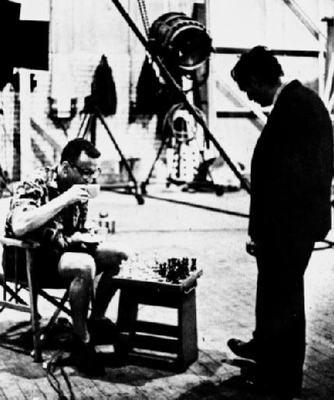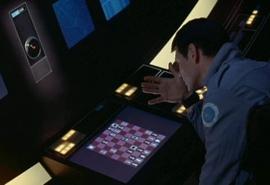
In the early 1960s, I wrote an appreciative essay for The New Yorker about the science fiction of Arthur Clarke. Not long after I got a letter from Clarke written from Sri Lanka where he lived. He told me that he was coming to New York in a few weeks and wanted to meet me. When we met, I asked him the purpose of his visit. His answer totally astonished me. “I am working on the son of Dr. Strangelove,” is what he said. The film had just come out and the first time I saw it I was so impressed that I sat through it a second time. “Stanley,” he said referring to Kubrick, “is a remarkable man. You should meet him.”
I told Clarke that nothing would please me more. Much to my amazement, the next day Clarke called to say that I was expected that afternoon at Kubrick’s apartment on Central Park West. I had never met a movie mogul and had no idea what to expect. But as soon as Kubrick opened the door I felt an immediate kindred spirit. He looked and acted like every obsessive theoretical physicist I have ever known. His obsession at that moment was whether or not anything could go faster than the speed of light. I explained to him that according to the theory of relativity no information bearing signal could go faster. We conversed like that for about an hour when I looked at my watch and realized I had to go. “Why?” he asked, seeing no reason why a conversation that he was finding interesting should stop.
I told him I had a date with a chess hustler in Washington Square Park to play for money. Kubrick wanted the name. “Fred Duval” I said. Duval was a Haitian who claimed to be related to Francois Duvalier. I was absolutely positive that the name would mean nothing to Kubrick. His next remark nearly floored me. “Duval is a patzer,” is what he said. Unless you have been around chess players you cannot imagine what an insult this is. Moreover, Duval and I were playing just about even. What did that make me?
Kubrick explained that early in his career he too played chess for money in the park and that Duval was so weak that it was hardly worth playing him. I said that we should play some time and then left the apartment. I was quite sure that we would never play. I was wrong.
I wrote a Talk of the Town on my meeting with Kubrick, which he liked. I was thus emboldened to ask if I could write a full scale profile of him. He agreed but said that he was about to leave for London to begin production of what became 2001: A Space Odyssey. Still better, I thought: I could watch the making of the film. Our first meeting was at the Hotel Dorchester in London where he was temporarily living with his family. Kubrick brought out a chess set and beat me promptly. Then we played three more games and he beat me less promptly. But I won the fifth game!

Seizing the moment I told him that I had been hustling him and had deliberately lost the first four games. His response was that I was a patzer. All during the filming of 2001 we played chess whenever I was in London and every fifth game I did something unusual. Finally we reached the 25th game and it was agreed that this would decide the matter. Well into the game he made a move that I was sure was a loser. He even clutched his stomach to show how upset he was. But it was a trap and I was promptly clobbered. “You didn’t know I could act too,” he remarked.
The scene now shifts to the spring of 1972. I was spending the year at Oxford, and spent some Sundays with the Kubricks. Our interest again turned to chess but this time it was with the imminent match between Bobby Fischer and Boris Spassky in Iceland. One Sunday, Kubrick and I watched Fischer’s interview with Mike Wallace for “60 Minutes.” It was around the time of Fischer’s birthday and Wallace had come with a cake. “I don’t like that kind of cake,” Fischer said graciously. Then he told Wallace how he had learned to play chess. His older sister had taught him the moves. He soon began beating her so he spotted her pieces. Then he said that that no longer worked so he began playing with himself—Fischer vs. Fischer. “Mostly I won,” he commented with no trace of humor.
I expected a pleasant summer in Oxford reading about the match but one morning in May the phone rang in my office. The man on the line identified himself as the features editor of Playboy. He informed me that Hugh Heffner was interested in chess and had read my New Yorker profile of Kubrick. They had decided that I was the perfect person to write about the Fischer-Spassky match for Playboy. They would pay all my expenses and I would even have the American grandmaster Larry Evans at my disposal. It sounded too good to be true and, indeed, I had a problem. My writing for the New Yorker was not going down that well with my academic colleagues and writing for Playboy would be the last straw. He said not to worry I could use an assumed name. So I agreed. (I chose “Jay Amber”—“Bernstein” being the German for “Amber.”)
Advertisement
Much has been written about the match and I will only add a few personal recollections. Fischer got there the fourth of July, two days after the match had been scheduled to start. When the first game actually began on the eleventh, Spassky showed up on time but there was no Fischer. Finally, Fischer arrived, and quickly made it clear that he was much more concerned by a TV cameraman’s recording of the games than actually playing them. Indeed, after an incredibly bad move, he lost. Fischer then failed to appear at all for the second game, which he forfeited to go down two-zip.
That was about as good as it got for Spassky. Once Fischer actually began to play it was clear that Spassky had no chance. Fischer was in another league. There was a room at the tournament where grandmasters met to watch. They would predict Fischer’s next move and, more often than not, he would do something none of them had anticipated. A remarkable group of writers including Arthur Koestler and Harold Schonberg, who had played chess with Fischer and was the music critic of The New York Times, also turned up. We gathered in the lobby of the Hotel Loftleider to exchange stories and to catch an occasional glimpse of Fischer as he went off for midnight bowling.

When the match ended Schonberg predicted that Fischer would never play another. At the time I thought that Schonberg was surely wrong, but he wasn’t. The only match he ever did play was in 1992 when he played Spassky again, this time in Yugoslavia. Fischer won but the experts detected a decline in his game. He was succeeded as world champion first by Anatoly Karpov and then by Garry Kasparov, whose 1997 loss to the chess computer Deep Blue, had, in a sense, been predicted by Kubrick and Clarke decades earlier. In Kubrick’s 2001, before HAL 9000, the villainous computer, turns murderous, he roundly beats his human opponent, the astronaut Frank Poole, in a chess match.
For his part, Fischer spent the rest of his life a fugitive from both American and Japanese law. In 2005 he returned to Iceland, where he sought asylum. He was granted Icelandic citizenship and died in Reykjavik on January 17, 2008.


